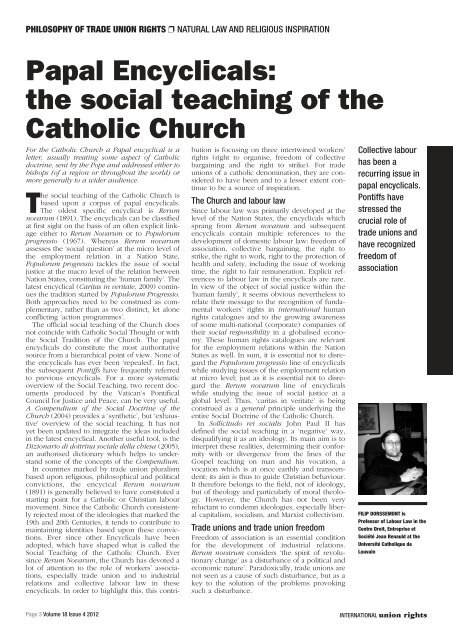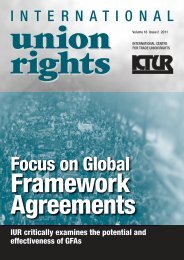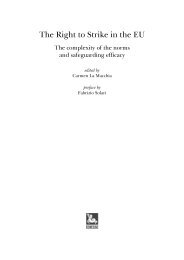International Centre for Trade Union Rights
International Centre for Trade Union Rights
International Centre for Trade Union Rights
You also want an ePaper? Increase the reach of your titles
YUMPU automatically turns print PDFs into web optimized ePapers that Google loves.
PHILOSOPHY OF TRADE UNION RIGHTS ❐ NATURAL LAW AND RELIGIOUS INSPIRATION<br />
Papal Encyclicals:<br />
the social teaching of the<br />
Catholic Church<br />
For the Catholic Church a Papal encyclical is a<br />
letter, usually treating some aspect of Catholic<br />
doctrine, sent by the Pope and addressed either to<br />
bishops (of a region or throughout the world) or<br />
more generally to a wider audience.<br />
The social teaching of the Catholic Church is<br />
based upon a corpus of papal encyclicals.<br />
The oldest specific encyclical is Rerum<br />
novarum (1891). The encyclicals can be classified<br />
at first sight on the basis of an often explicit linkage<br />
either to Rerum Novarum or to Populorum<br />
progressio (1967). Whereas Rerum novarum<br />
assesses the ‘social question’ at the micro level of<br />
the employment relation in a Nation State,<br />
Populorum progressio tackles the issue of social<br />
justice at the macro level of the relation between<br />
Nation States, constituting the ‘human family’. The<br />
latest encyclical (Caritas in veritate, 2009) continues<br />
the tradition started by Populorum Progressio.<br />
Both approaches need to be construed as complementary,<br />
rather than as two distinct, let alone<br />
conflicting ‘action programmes’.<br />
The official social teaching of the Church does<br />
not coincide with Catholic Social Thought or with<br />
the Social Tradition of the Church. The papal<br />
encyclicals do constitute the most authoritative<br />
source from a hierarchical point of view. None of<br />
the encyclicals has ever been ‘repealed’. In fact,<br />
the subsequent Pontiffs have frequently referred<br />
to previous encyclicals. For a more systematic<br />
overview of the Social Teaching, two recent documents<br />
produced by the Vatican’s Pontifical<br />
Council <strong>for</strong> Justice and Peace, can be very useful.<br />
A Compendium of the Social Doctrine of the<br />
Church (2004) provides a ‘synthetic’, but ‘exhaustive’<br />
overview of the social teaching. It has not<br />
yet been updated to integrate the ideas included<br />
in the latest encyclical. Another useful tool, is the<br />
Dizionario di dottrina sociale della chiesa (2005),<br />
an authorised dictionary which helps to understand<br />
some of the concepts of the Compendium.<br />
In countries marked by trade union pluralism<br />
based upon religious, philosophical and political<br />
convictions, the encycical Rerum novarum<br />
(1891) is generally believed to have constituted a<br />
starting point <strong>for</strong> a Catholic or Christian labour<br />
movement. Since the Catholic Church consistently<br />
rejected most of the ideologies that marked the<br />
19th and 20th Centuries, it tends to contribute to<br />
maintaining identities based upon these convictions.<br />
Ever since other Encyclicals have been<br />
adopted, which have shaped what is called the<br />
Social Teaching of the Catholic Church. Ever<br />
since Rerum Novarum, the Church has devoted a<br />
lot of attention to the role of workers’ associations,<br />
especially trade union and to industrial<br />
relations and collective labour law in these<br />
encyclicals. In order to highlight this, this contri-<br />
bution is focusing on three intertwined workers’<br />
rights (right to organise, freedom of collective<br />
bargaining and the right to strike). For trade<br />
unions of a catholic denomination, they are considered<br />
to have been and to a lesser extent continue<br />
to be a source of inspiration.<br />
The Church and labour law<br />
Since labour law was primarily developed at the<br />
level of the Nation States, the encyclicals which<br />
sprang from Rerum novarum and subsequent<br />
encyclicals contain multiple references to the<br />
development of domestic labour law: freedom of<br />
association, collective bargaining, the right to<br />
strike, the right to work, right to the protection of<br />
health and safety, including the issue of working<br />
time, the right to fair remuneration. Explicit references<br />
to labour law in the encyclicals are rare.<br />
In view of the object of social justice within the<br />
‘human family’, it seems obvious nevertheless to<br />
relate their message to the recognition of fundamental<br />
workers’ rights in international human<br />
rights catalogues and to the growing awareness<br />
of some multi-national (corporate) companies of<br />
their social responsibility in a globalised economy.<br />
These human rights catalogues are relevant<br />
<strong>for</strong> the employment relations within the Nation<br />
States as well. In sum, it is essential not to disregard<br />
the Populorum progressio line of encyclicals<br />
while studying issues of the employment relation<br />
at micro level; just as it is essential not to disregard<br />
the Rerum novarum line of encyclicals<br />
while studying the issue of social justice at a<br />
global level. Thus, ‘caritas in veritate’ is being<br />
construed as a general principle underlying the<br />
entire Social Doctrine of the Catholic Church.<br />
In Sollicitudo rei socialis John Paul II has<br />
defined the social teaching in a ‘negative’ way,<br />
disqualifying it as an ideology. Its main aim is to<br />
interpret these realities, determining their con<strong>for</strong>mity<br />
with or divergence from the lines of the<br />
Gospel teaching on man and his vocation, a<br />
vocation which is at once earthly and transcendent;<br />
its aim is thus to guide Christian behaviour.<br />
It there<strong>for</strong>e belongs to the field, not of ideology,<br />
but of theology and particularly of moral theology.<br />
However, the Church has not been very<br />
reluctant to condemn ideologies, especially liberal<br />
capitalism, socialism, and Marxist collectivism.<br />
<strong>Trade</strong> unions and trade union freedom<br />
Freedom of association is an essential condition<br />
<strong>for</strong> the development of industrial relations.<br />
Rerum novarum considers ‘the spirit of revolutionary<br />
change’ as a disturbance of a political and<br />
economic nature’. Paradoxically, trade unions are<br />
not seen as a cause of such disturbance, but as a<br />
key to the solution of the problems provoking<br />
such a disturbance.<br />
Collective labour<br />
has been a<br />
recurring issue in<br />
papal encyclicals.<br />
Pontiffs have<br />
stressed the<br />
crucial role of<br />
trade unions and<br />
have recognized<br />
freedom of<br />
association<br />
FILIP DORSSEMONT is<br />
Professor of Labour Law in the<br />
<strong>Centre</strong> Droit, Entreprise et<br />
Société Jean Renauld at the<br />
Université Catholique de<br />
Louvain<br />
Page 3 Volume 18 Issue 4 2012<br />
INTERNATIONAL union rights





